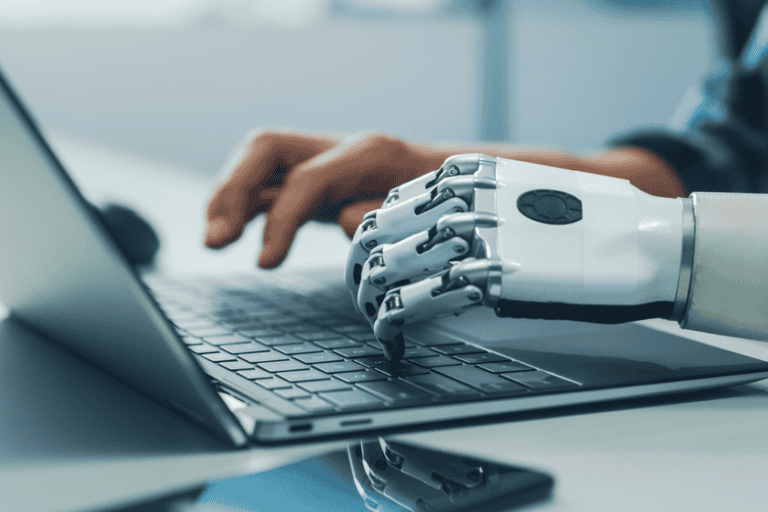OutSystems has taken a promising step toward AI-assisted application development with the introduction of Mentor. This innovative tool promises not to replace developers but to empower them in building complex, mission-critical applications. We sit down with OutSystems CEO Paulo Rosado to discuss the future of software development.
OutSystems has transformed Project Morpheus into OutSystems Mentor. A new chapter in software development that relies on the capabilities of AI. For this, OutSystems’ solution relies on low-code, not on programming languages and code, as in GitHub, for example. Therefore, the AI tool Mentor is also not a Copilot alternative. Instead, it generates a fully functional application based on a written command, leveraging the company’s low-code application development framework.
Staying true to low-code roots
With Mentor, OutSystems is not outgrowing its roots. “Since the beginning, we have strived to shorten the time to build software projects. After thirteen years of operation, this was named low-code. This abstraction layer based on visual aspects was crucial to shorten the time and increase the predictability of software development,” Paulo Rosado, CEO of OutSystems, told Techzine in an exclusive interview.
The software development life cycle (SDLC) continues to evolve through AI automation. The development platform is gaining an additional layer that will ultimately merge AI and low-code technologies. This combination offers a distinct advantage: AI makes fewer mistakes due to the reduced complexity of low-code environments.
The extra time provided by AI gives companies a chance to look at “what’s under the tip of the iceberg,” as Rosado puts it. It verbalises the backlog that app developers have built up over the years. Below the top are the projects that are not business-critical, for example, a legacy app that desperately needs a more user-friendly look and feel.
Interaction between developer and Mentor
Automation significantly reduces application development time. This is necessary to build more apps and continue to meet business expectations. According to OutSystems ‘ research, the demand for apps is surging across all industries. Nearly three-quarters (74 percent) of respondents said their organization wants to develop more than ten apps in the next year, and 45 percent of them even expect to develop more than 25 apps. So, a faster SDLC is an absolute necessity.
During a live demonstration at ONE Conference in Amsterdam, OutSystems showcased the capabilities of Mentor. The tool needed to develop an app based on a document specifying its utility required third-party integrations and core functions. Generative AI effortlessly processes this document into an overview that lists the various roles and components of the app.
Importantly, Mentor maintains developer involvement throughout the process. Developers must review and approve each stage, allowing for customization of terminology and component names. For example, the name of a component can be adjusted if the name in the third-party application that needs to be connected differs from the one in the specifications. After the adjustments are made, Mentor compiles the data model and roles. Once that is in place, app generation follows, for which the tool extracts information from the data systems and the app description.
GenAI also allows Mentor to reason, which in the demonstration led to elements that Mentor added to the app. It reasoned that the description was incomplete and added what was missing, namely an option to cancel an order, next to the option to agree that was mentioned in the description.
Saving time without risk
In the 30-minute demonstration, a functioning app was developed. “But speed can create technical and security problems without proper management,” warns Rosado. This a statement he obviously would not risk if Mentor did not oversee these problems.
OutSystems distinguishes Mentor from other solutions by three unique characteristics:
- Context and focus: OutSystems leverages business-specific application knowledge in a way that other solutions cannot. By leveraging information about applications already created within the enterprise, Mentor not only helps build relevant apps but also reduces the risk of hallucinations. This is because the AI is founded on the company’s own enterprise data.
- Model-driven development: The tool increases developer productivity by letting them focus on what really matters. Mentor uses tested models and abstractions, allowing developers to work more efficiently without sacrificing quality.
- Security and management: Mentor goes beyond app development. The tool also supports application maintenance by performing AI-driven code reviews. Moreover, OutSystems employs a careful security model that filters confidential information before sharing it with external AI systems. Data is also transmitted piecemeal so that complete code cannot be reconstructed all at once.
A future without developers is a fantasy
OutSystems firmly rejects the notion that tools like Mentor will eliminate the need for skilled developers. “These tools help developers build bigger, more complex and relevant things. Building even moderately important business systems requires professionals who understand business operations and processes and can craft exceptional user experiences,” the CEO stated.
Unlike some low-code vendors claiming their tools can enable app development for non-technical users, Rosado claims those stories are pure fantasy. “To build a system that is even slightly important to the business, you need professionals. You need that to ensure the continuous evolution of the system. No- or low-code tools that claim otherwise are often not very sophisticated and create the next layer of legacy apps because there is no evolution in the developed product.”
With Mentor, OutSystems presents an AI tool that supports the developer. Regardless of whether this developer has only just entered the profession or has been in it for years. Both profiles can certainly use some extra support to finally make large, complex projects manageable or to guide them through their first project.
Tip! Devin is the first AI software engineer: should developers be worried?
